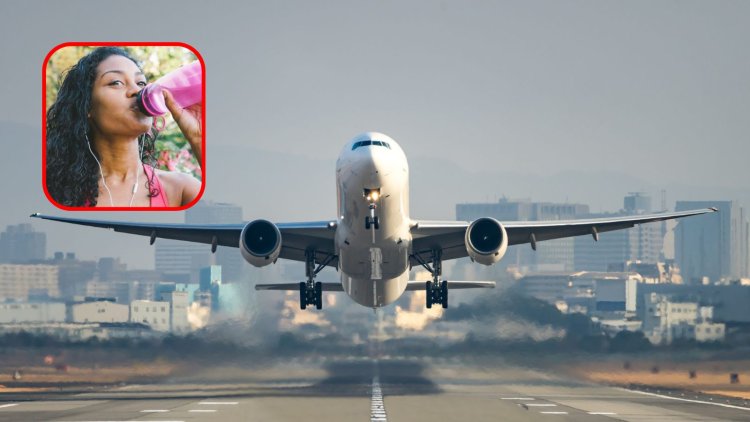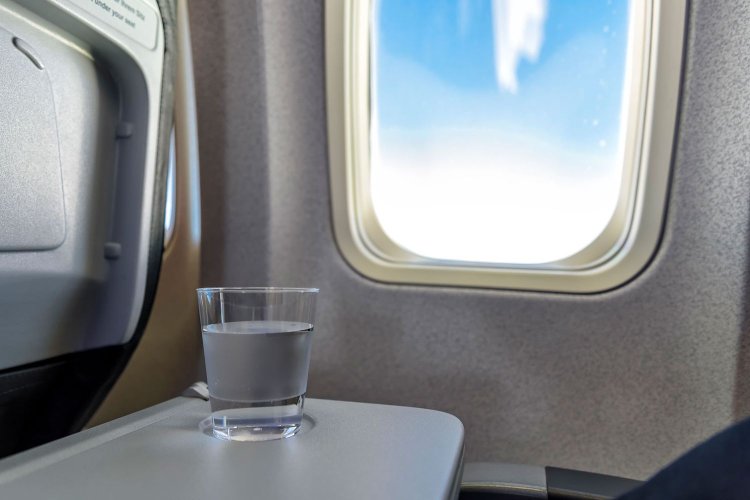How Much Water You Can Lose On A 15-Hour Flight
Between the routine disruption, free-flowing drinks, overuse of hand sanitiser and dry aeroplane cabins, staying hydrated while flying is no small feat.

Long-haul flights, for instance from Nairobi to Bangkok or Nairobi to London, are every air traveller's dream. One just has to sit inside a plane for more than 12 hours, watch as many movies and series while on board, eat as much as you are fed by cabin crew and sleep without interruptions.
However, long-haul flights are punishing to one's body as not only do you end up consuming a lot of calories from plane food, but long-haul flights can take a considerable toll on you physically, too, and it is even worse when it is ultra-long-haul (from Nairobi to New York non-stop).
Spending a long period of time confined in a reduced oxygen environment with low humidity can be a real cause for dehydration, especially when the relative humidity can be as low as 10-15 per cent, which is three times drier than the Sahara desert.
Between the routine disruption, free-flowing drinks, overuse of hand sanitiser and dry aeroplane cabins, staying hydrated while flying is no small feat. But it’s one of the most vital steps to ensure you arrive at your destination feeling fresh as you did when you began travelling.

A cup of water being served in an aeroplane. /TRAVEL+LEISURE
Flight experts reveal that when at cruising altitude, commercial airliners bring in the outside air as part of the normal circulation process which also keeps the cabin pressurised from the outside atmosphere in high altitudes that can kill an ordinary human in seconds.
“One advantage of this is air is exchanged more often than [almost] any other building, making the air safer to breathe from a viral transmission perspective.
"The downside of this is the lack of humidification, usually around 15% to 20%, which is half of what people find comfortable," Bob Bacheler, the managing director and in-flight nurse at Flying Angels, revealed to CNN in 2022.
How Much Water Do You Lose Per Hour?
According to Bacheler, the human body loses about 0.24 litres (8 ounces) of water per hour on an aircraft at altitude, mostly from breathing.
If we were to take into consideration a 15-hour flight, the body would lose 3.6 litres of water for the entire duration of the flight, and probably more if one was doing connecting flights between destinations.
In worst-case scenarios, dehydration can cause death, which is quite unlikely, even on an ultra-long-haul flight.
However, less sinister effects, including irritability, fatigue, and attention deficit, could be likely for the course. Dehydration also dries out the body’s mucous membranes, making it harder for them to prevent bacterial or viral infections.
As such, the Aerospace Medical Association (AsMA) recommends drinking about 0.25 litres (or 8 ounces) of water per hour while on an aeroplane.
One is also recommended to hydrate before boarding your flight and drink lots of water throughout the flight, avoiding the typical temptation of free alcohol (booze) and trying to remember to pick up a bottle of water after you’ve gone through security.
However, if you feel like you have to order a coffee or alcoholic drink onboard, it is best to also ask for some water on the side.
If drinking pure water doesn’t sound too enticing, you can also hydrate yourself with a soft drink. At the airport, you can buy drinks after the security control at various airport shops and restaurants.
Listen to your body
It is not such a good idea to avoid drinking water simply to avoid using the bathroom on an aeroplane. Especially on a long flight, stretching your legs every now and then is also important for circulation.
Excessive hydration, however, is unnecessary. It is good to quench your thirst to avoid the uncomfortable symptoms of dehydration, but for a healthy adult, it is not something that warrants too much stress as your body will recover with extra rehydration after the flight if needed.
To avoid possible uncomfortableness caused by dry aeroplane air, it may also be practical to hydrate your body externally.
Furthermore, if you have dry eyes, you can keep eye drops in your hand luggage as well as hydrating nasal sprays. Instead of contact lenses, it can be better to use regular glasses and dry skin can be moisturised.


 admin
admin 




